Organisational Behaviour Report: Culture, Motivation, and Leadership
VerifiedAdded on 2023/01/19
|20
|6316
|60
Report
AI Summary
This report provides a comprehensive analysis of organisational behaviour, using Debenhams as a case study. It examines the influence of organisational culture, politics, and power on individual and team behaviour and performance. The report delves into content and process theories of motivation, exploring motivational techniques and the differences between effective and ineffective teams. Furthermore, it investigates the concepts and philosophies of organisational behaviour, including various leadership styles. The analysis considers how these factors impact employee performance and contributes to the overall achievement of organisational objectives within the context of a multinational retail environment.
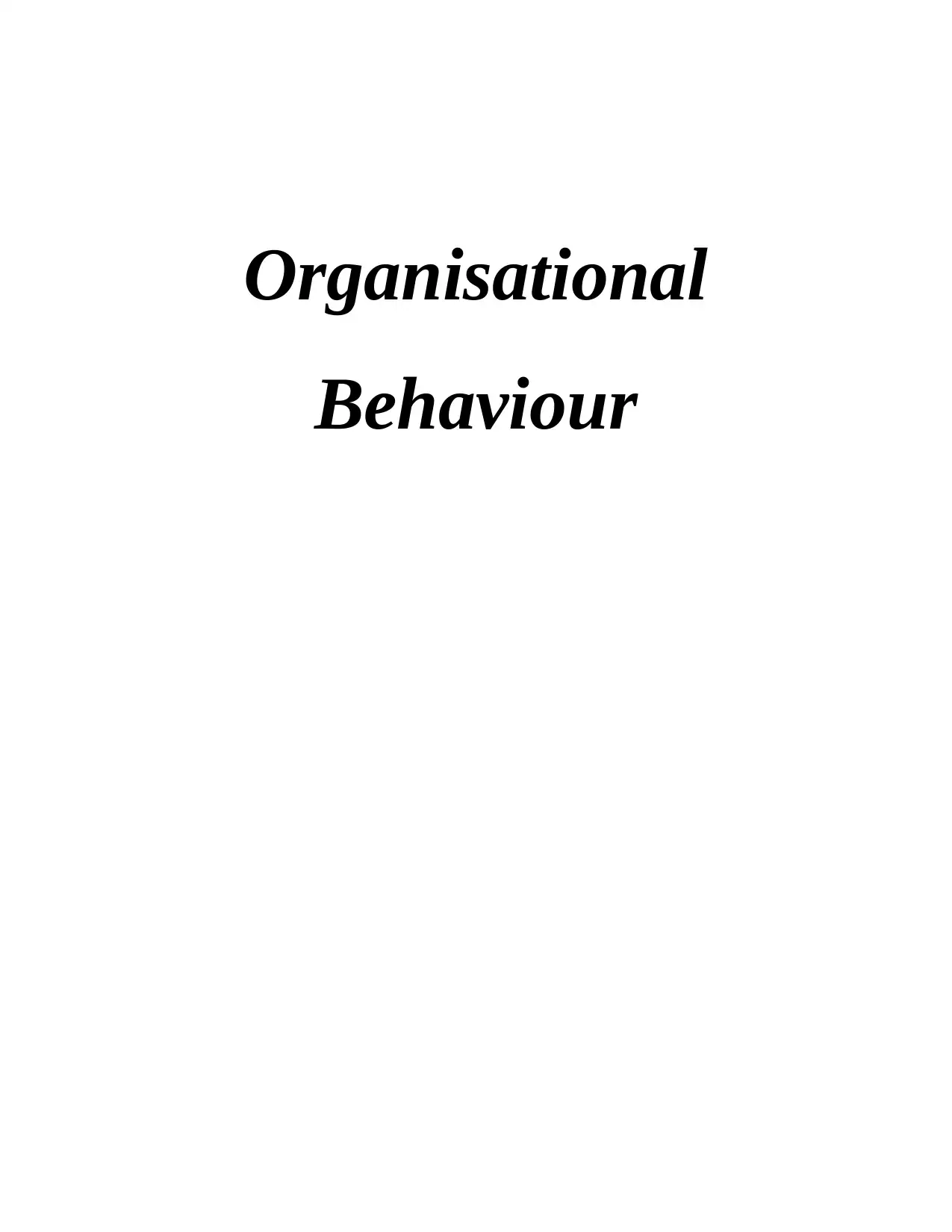
Organisational
Behaviour
Behaviour
Paraphrase This Document
Need a fresh take? Get an instant paraphrase of this document with our AI Paraphraser
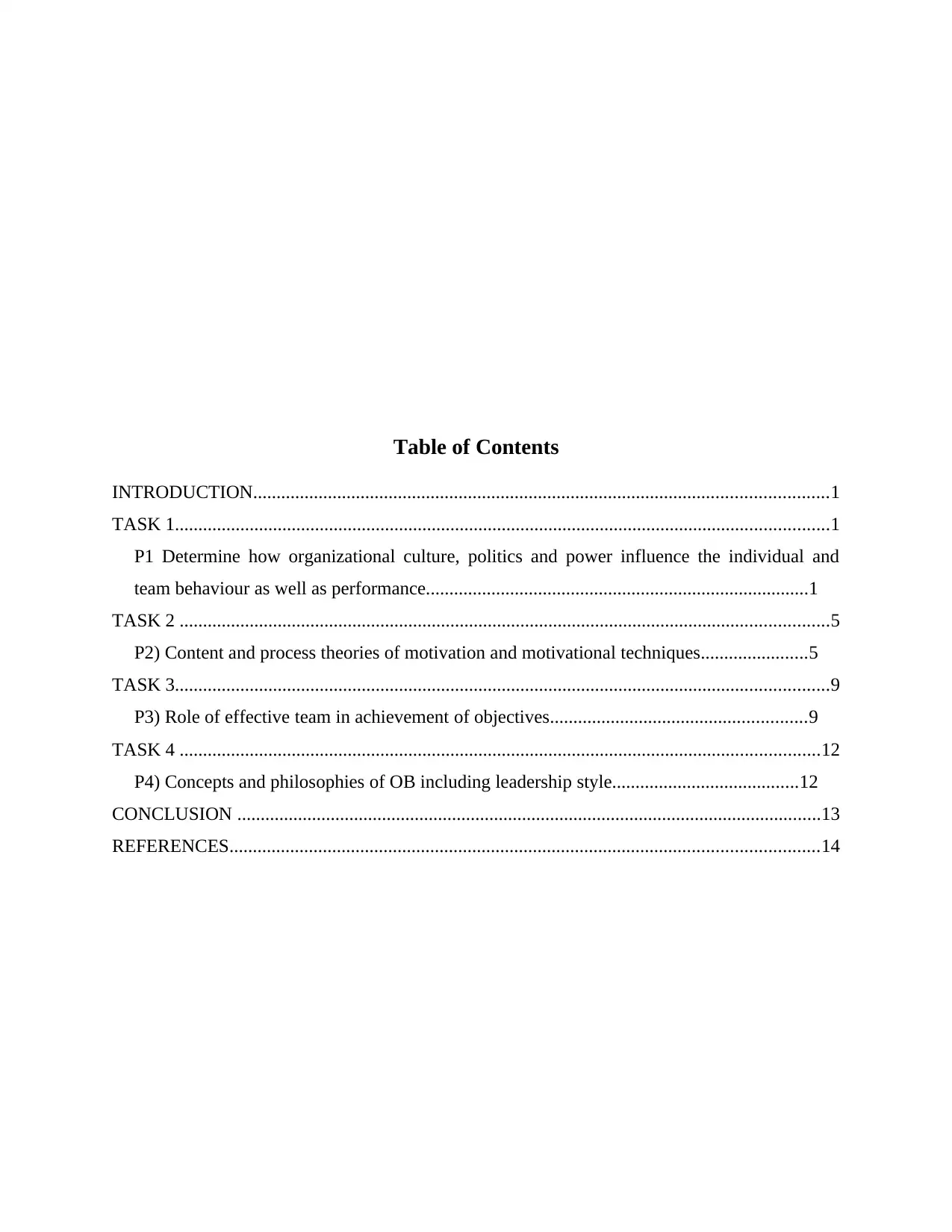
Table of Contents
INTRODUCTION...........................................................................................................................1
TASK 1............................................................................................................................................1
P1 Determine how organizational culture, politics and power influence the individual and
team behaviour as well as performance..................................................................................1
TASK 2 ...........................................................................................................................................5
P2) Content and process theories of motivation and motivational techniques.......................5
TASK 3............................................................................................................................................9
P3) Role of effective team in achievement of objectives.......................................................9
TASK 4 .........................................................................................................................................12
P4) Concepts and philosophies of OB including leadership style........................................12
CONCLUSION .............................................................................................................................13
REFERENCES..............................................................................................................................14
INTRODUCTION...........................................................................................................................1
TASK 1............................................................................................................................................1
P1 Determine how organizational culture, politics and power influence the individual and
team behaviour as well as performance..................................................................................1
TASK 2 ...........................................................................................................................................5
P2) Content and process theories of motivation and motivational techniques.......................5
TASK 3............................................................................................................................................9
P3) Role of effective team in achievement of objectives.......................................................9
TASK 4 .........................................................................................................................................12
P4) Concepts and philosophies of OB including leadership style........................................12
CONCLUSION .............................................................................................................................13
REFERENCES..............................................................................................................................14

⊘ This is a preview!⊘
Do you want full access?
Subscribe today to unlock all pages.

Trusted by 1+ million students worldwide
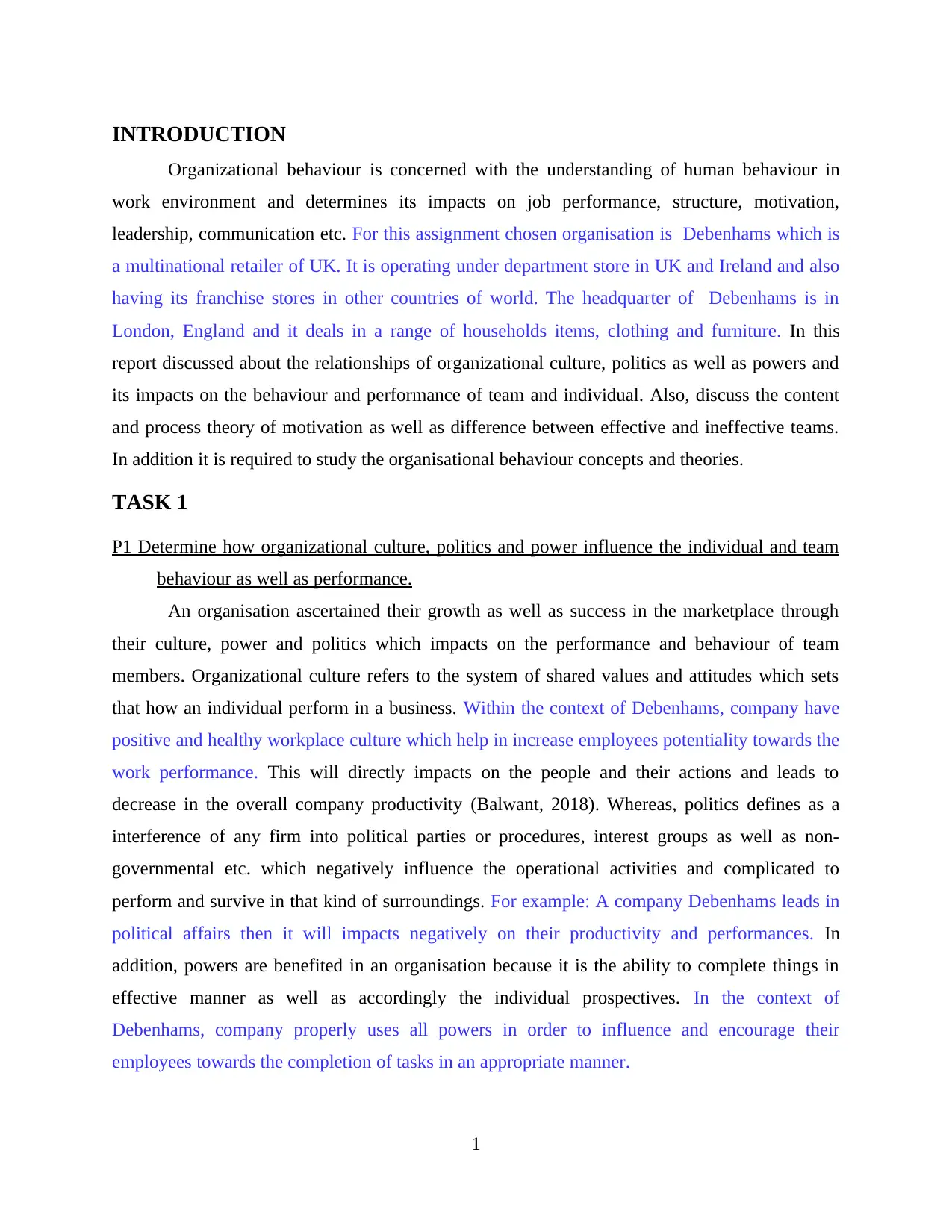
INTRODUCTION
Organizational behaviour is concerned with the understanding of human behaviour in
work environment and determines its impacts on job performance, structure, motivation,
leadership, communication etc. For this assignment chosen organisation is Debenhams which is
a multinational retailer of UK. It is operating under department store in UK and Ireland and also
having its franchise stores in other countries of world. The headquarter of Debenhams is in
London, England and it deals in a range of households items, clothing and furniture. In this
report discussed about the relationships of organizational culture, politics as well as powers and
its impacts on the behaviour and performance of team and individual. Also, discuss the content
and process theory of motivation as well as difference between effective and ineffective teams.
In addition it is required to study the organisational behaviour concepts and theories.
TASK 1
P1 Determine how organizational culture, politics and power influence the individual and team
behaviour as well as performance.
An organisation ascertained their growth as well as success in the marketplace through
their culture, power and politics which impacts on the performance and behaviour of team
members. Organizational culture refers to the system of shared values and attitudes which sets
that how an individual perform in a business. Within the context of Debenhams, company have
positive and healthy workplace culture which help in increase employees potentiality towards the
work performance. This will directly impacts on the people and their actions and leads to
decrease in the overall company productivity (Balwant, 2018). Whereas, politics defines as a
interference of any firm into political parties or procedures, interest groups as well as non-
governmental etc. which negatively influence the operational activities and complicated to
perform and survive in that kind of surroundings. For example: A company Debenhams leads in
political affairs then it will impacts negatively on their productivity and performances. In
addition, powers are benefited in an organisation because it is the ability to complete things in
effective manner as well as accordingly the individual prospectives. In the context of
Debenhams, company properly uses all powers in order to influence and encourage their
employees towards the completion of tasks in an appropriate manner.
1
Organizational behaviour is concerned with the understanding of human behaviour in
work environment and determines its impacts on job performance, structure, motivation,
leadership, communication etc. For this assignment chosen organisation is Debenhams which is
a multinational retailer of UK. It is operating under department store in UK and Ireland and also
having its franchise stores in other countries of world. The headquarter of Debenhams is in
London, England and it deals in a range of households items, clothing and furniture. In this
report discussed about the relationships of organizational culture, politics as well as powers and
its impacts on the behaviour and performance of team and individual. Also, discuss the content
and process theory of motivation as well as difference between effective and ineffective teams.
In addition it is required to study the organisational behaviour concepts and theories.
TASK 1
P1 Determine how organizational culture, politics and power influence the individual and team
behaviour as well as performance.
An organisation ascertained their growth as well as success in the marketplace through
their culture, power and politics which impacts on the performance and behaviour of team
members. Organizational culture refers to the system of shared values and attitudes which sets
that how an individual perform in a business. Within the context of Debenhams, company have
positive and healthy workplace culture which help in increase employees potentiality towards the
work performance. This will directly impacts on the people and their actions and leads to
decrease in the overall company productivity (Balwant, 2018). Whereas, politics defines as a
interference of any firm into political parties or procedures, interest groups as well as non-
governmental etc. which negatively influence the operational activities and complicated to
perform and survive in that kind of surroundings. For example: A company Debenhams leads in
political affairs then it will impacts negatively on their productivity and performances. In
addition, powers are benefited in an organisation because it is the ability to complete things in
effective manner as well as accordingly the individual prospectives. In the context of
Debenhams, company properly uses all powers in order to influence and encourage their
employees towards the completion of tasks in an appropriate manner.
1
Paraphrase This Document
Need a fresh take? Get an instant paraphrase of this document with our AI Paraphraser
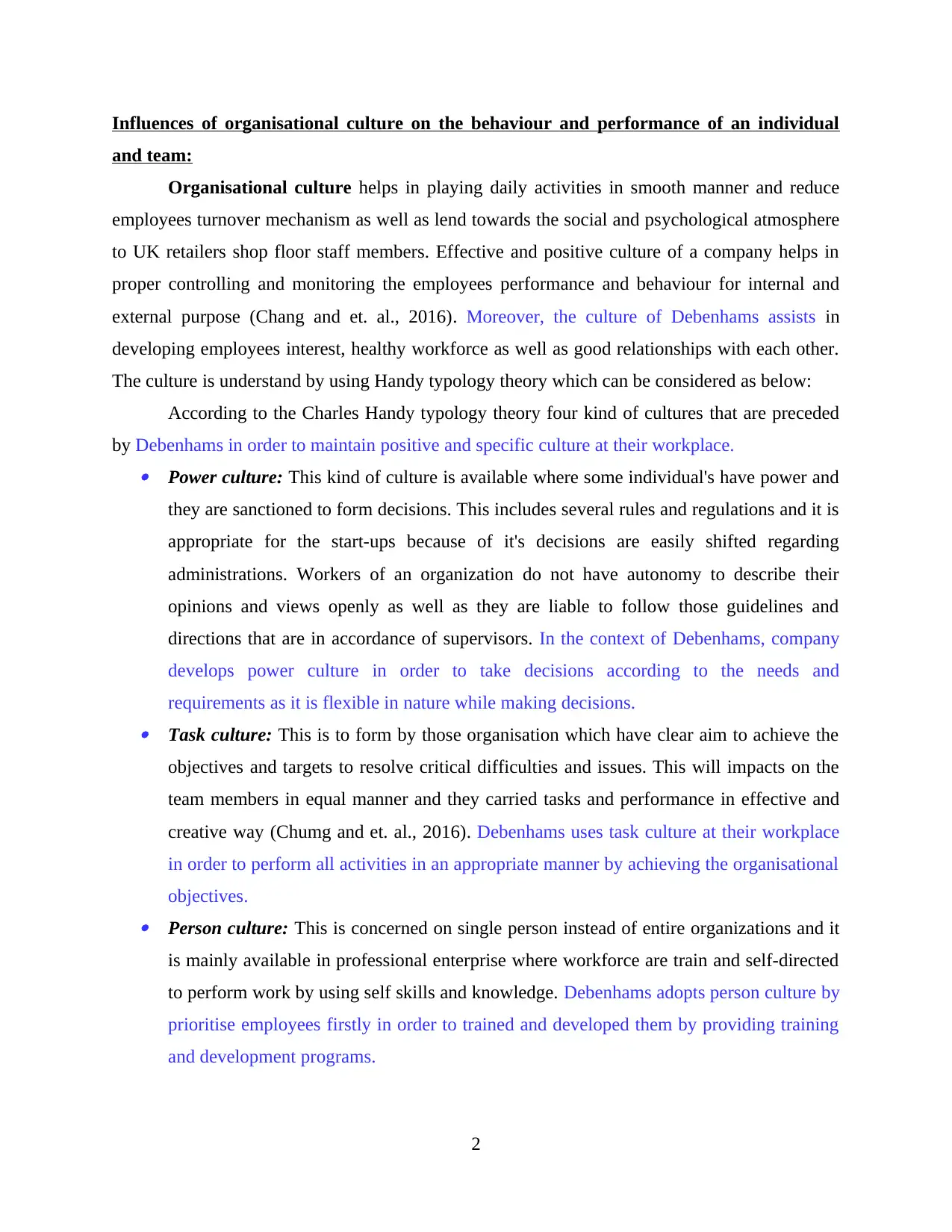
Influences of organisational culture on the behaviour and performance of an individual
and team:
Organisational culture helps in playing daily activities in smooth manner and reduce
employees turnover mechanism as well as lend towards the social and psychological atmosphere
to UK retailers shop floor staff members. Effective and positive culture of a company helps in
proper controlling and monitoring the employees performance and behaviour for internal and
external purpose (Chang and et. al., 2016). Moreover, the culture of Debenhams assists in
developing employees interest, healthy workforce as well as good relationships with each other.
The culture is understand by using Handy typology theory which can be considered as below:
According to the Charles Handy typology theory four kind of cultures that are preceded
by Debenhams in order to maintain positive and specific culture at their workplace. Power culture: This kind of culture is available where some individual's have power and
they are sanctioned to form decisions. This includes several rules and regulations and it is
appropriate for the start-ups because of it's decisions are easily shifted regarding
administrations. Workers of an organization do not have autonomy to describe their
opinions and views openly as well as they are liable to follow those guidelines and
directions that are in accordance of supervisors. In the context of Debenhams, company
develops power culture in order to take decisions according to the needs and
requirements as it is flexible in nature while making decisions. Task culture: This is to form by those organisation which have clear aim to achieve the
objectives and targets to resolve critical difficulties and issues. This will impacts on the
team members in equal manner and they carried tasks and performance in effective and
creative way (Chumg and et. al., 2016). Debenhams uses task culture at their workplace
in order to perform all activities in an appropriate manner by achieving the organisational
objectives. Person culture: This is concerned on single person instead of entire organizations and it
is mainly available in professional enterprise where workforce are train and self-directed
to perform work by using self skills and knowledge. Debenhams adopts person culture by
prioritise employees firstly in order to trained and developed them by providing training
and development programs.
2
and team:
Organisational culture helps in playing daily activities in smooth manner and reduce
employees turnover mechanism as well as lend towards the social and psychological atmosphere
to UK retailers shop floor staff members. Effective and positive culture of a company helps in
proper controlling and monitoring the employees performance and behaviour for internal and
external purpose (Chang and et. al., 2016). Moreover, the culture of Debenhams assists in
developing employees interest, healthy workforce as well as good relationships with each other.
The culture is understand by using Handy typology theory which can be considered as below:
According to the Charles Handy typology theory four kind of cultures that are preceded
by Debenhams in order to maintain positive and specific culture at their workplace. Power culture: This kind of culture is available where some individual's have power and
they are sanctioned to form decisions. This includes several rules and regulations and it is
appropriate for the start-ups because of it's decisions are easily shifted regarding
administrations. Workers of an organization do not have autonomy to describe their
opinions and views openly as well as they are liable to follow those guidelines and
directions that are in accordance of supervisors. In the context of Debenhams, company
develops power culture in order to take decisions according to the needs and
requirements as it is flexible in nature while making decisions. Task culture: This is to form by those organisation which have clear aim to achieve the
objectives and targets to resolve critical difficulties and issues. This will impacts on the
team members in equal manner and they carried tasks and performance in effective and
creative way (Chumg and et. al., 2016). Debenhams uses task culture at their workplace
in order to perform all activities in an appropriate manner by achieving the organisational
objectives. Person culture: This is concerned on single person instead of entire organizations and it
is mainly available in professional enterprise where workforce are train and self-directed
to perform work by using self skills and knowledge. Debenhams adopts person culture by
prioritise employees firstly in order to trained and developed them by providing training
and development programs.
2
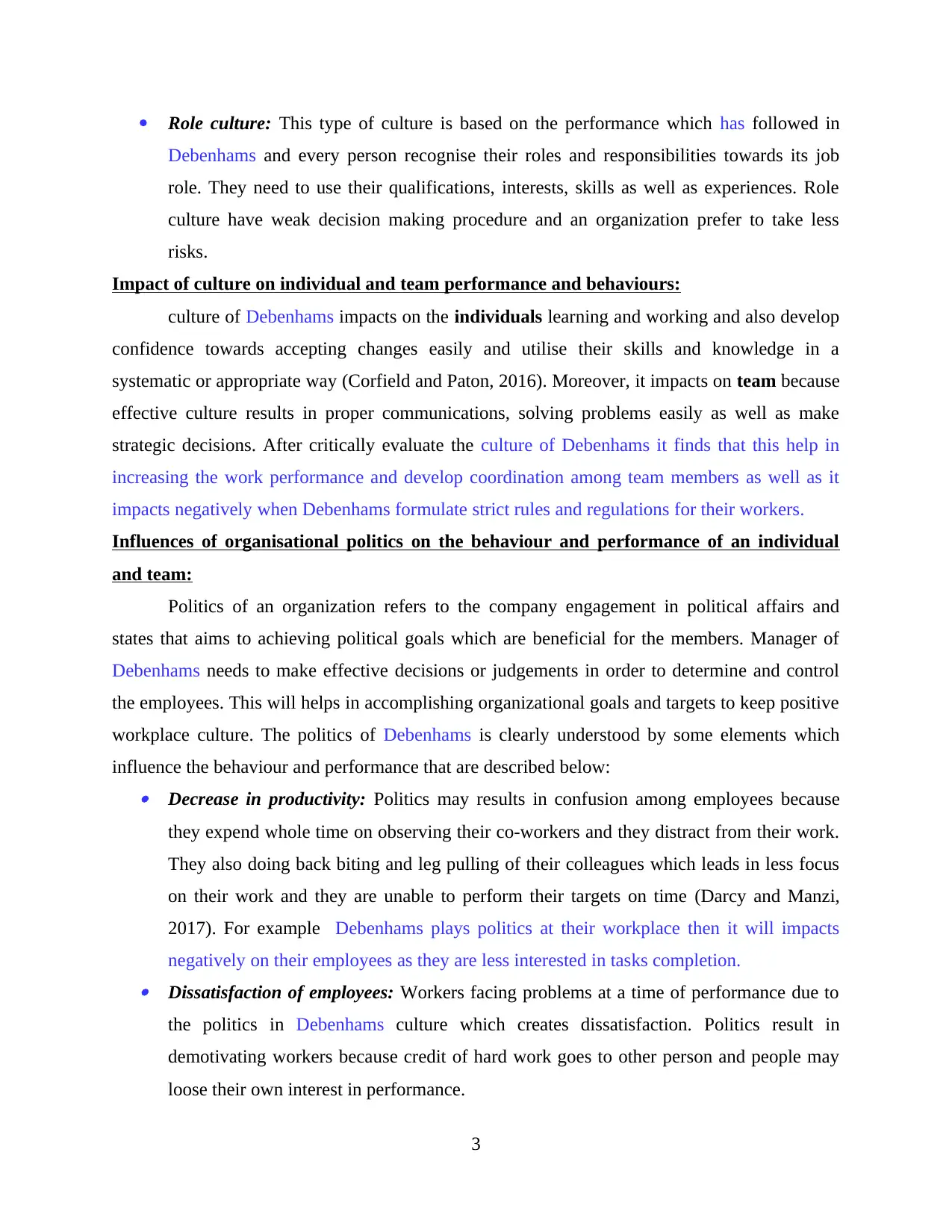
Role culture: This type of culture is based on the performance which has followed in
Debenhams and every person recognise their roles and responsibilities towards its job
role. They need to use their qualifications, interests, skills as well as experiences. Role
culture have weak decision making procedure and an organization prefer to take less
risks.
Impact of culture on individual and team performance and behaviours:
culture of Debenhams impacts on the individuals learning and working and also develop
confidence towards accepting changes easily and utilise their skills and knowledge in a
systematic or appropriate way (Corfield and Paton, 2016). Moreover, it impacts on team because
effective culture results in proper communications, solving problems easily as well as make
strategic decisions. After critically evaluate the culture of Debenhams it finds that this help in
increasing the work performance and develop coordination among team members as well as it
impacts negatively when Debenhams formulate strict rules and regulations for their workers.
Influences of organisational politics on the behaviour and performance of an individual
and team:
Politics of an organization refers to the company engagement in political affairs and
states that aims to achieving political goals which are beneficial for the members. Manager of
Debenhams needs to make effective decisions or judgements in order to determine and control
the employees. This will helps in accomplishing organizational goals and targets to keep positive
workplace culture. The politics of Debenhams is clearly understood by some elements which
influence the behaviour and performance that are described below: Decrease in productivity: Politics may results in confusion among employees because
they expend whole time on observing their co-workers and they distract from their work.
They also doing back biting and leg pulling of their colleagues which leads in less focus
on their work and they are unable to perform their targets on time (Darcy and Manzi,
2017). For example Debenhams plays politics at their workplace then it will impacts
negatively on their employees as they are less interested in tasks completion. Dissatisfaction of employees: Workers facing problems at a time of performance due to
the politics in Debenhams culture which creates dissatisfaction. Politics result in
demotivating workers because credit of hard work goes to other person and people may
loose their own interest in performance.
3
Debenhams and every person recognise their roles and responsibilities towards its job
role. They need to use their qualifications, interests, skills as well as experiences. Role
culture have weak decision making procedure and an organization prefer to take less
risks.
Impact of culture on individual and team performance and behaviours:
culture of Debenhams impacts on the individuals learning and working and also develop
confidence towards accepting changes easily and utilise their skills and knowledge in a
systematic or appropriate way (Corfield and Paton, 2016). Moreover, it impacts on team because
effective culture results in proper communications, solving problems easily as well as make
strategic decisions. After critically evaluate the culture of Debenhams it finds that this help in
increasing the work performance and develop coordination among team members as well as it
impacts negatively when Debenhams formulate strict rules and regulations for their workers.
Influences of organisational politics on the behaviour and performance of an individual
and team:
Politics of an organization refers to the company engagement in political affairs and
states that aims to achieving political goals which are beneficial for the members. Manager of
Debenhams needs to make effective decisions or judgements in order to determine and control
the employees. This will helps in accomplishing organizational goals and targets to keep positive
workplace culture. The politics of Debenhams is clearly understood by some elements which
influence the behaviour and performance that are described below: Decrease in productivity: Politics may results in confusion among employees because
they expend whole time on observing their co-workers and they distract from their work.
They also doing back biting and leg pulling of their colleagues which leads in less focus
on their work and they are unable to perform their targets on time (Darcy and Manzi,
2017). For example Debenhams plays politics at their workplace then it will impacts
negatively on their employees as they are less interested in tasks completion. Dissatisfaction of employees: Workers facing problems at a time of performance due to
the politics in Debenhams culture which creates dissatisfaction. Politics result in
demotivating workers because credit of hard work goes to other person and people may
loose their own interest in performance.
3
⊘ This is a preview!⊘
Do you want full access?
Subscribe today to unlock all pages.

Trusted by 1+ million students worldwide
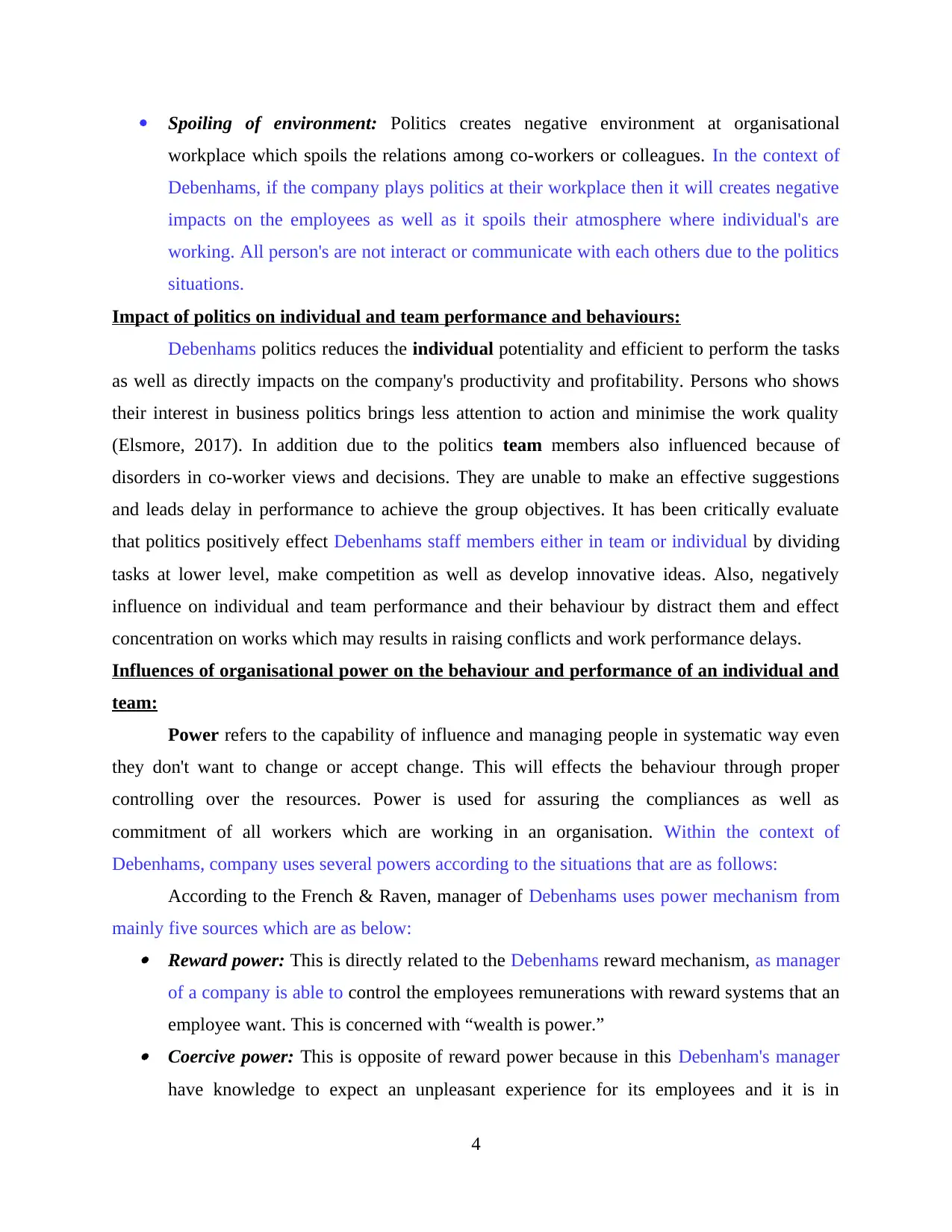
Spoiling of environment: Politics creates negative environment at organisational
workplace which spoils the relations among co-workers or colleagues. In the context of
Debenhams, if the company plays politics at their workplace then it will creates negative
impacts on the employees as well as it spoils their atmosphere where individual's are
working. All person's are not interact or communicate with each others due to the politics
situations.
Impact of politics on individual and team performance and behaviours:
Debenhams politics reduces the individual potentiality and efficient to perform the tasks
as well as directly impacts on the company's productivity and profitability. Persons who shows
their interest in business politics brings less attention to action and minimise the work quality
(Elsmore, 2017). In addition due to the politics team members also influenced because of
disorders in co-worker views and decisions. They are unable to make an effective suggestions
and leads delay in performance to achieve the group objectives. It has been critically evaluate
that politics positively effect Debenhams staff members either in team or individual by dividing
tasks at lower level, make competition as well as develop innovative ideas. Also, negatively
influence on individual and team performance and their behaviour by distract them and effect
concentration on works which may results in raising conflicts and work performance delays.
Influences of organisational power on the behaviour and performance of an individual and
team:
Power refers to the capability of influence and managing people in systematic way even
they don't want to change or accept change. This will effects the behaviour through proper
controlling over the resources. Power is used for assuring the compliances as well as
commitment of all workers which are working in an organisation. Within the context of
Debenhams, company uses several powers according to the situations that are as follows:
According to the French & Raven, manager of Debenhams uses power mechanism from
mainly five sources which are as below: Reward power: This is directly related to the Debenhams reward mechanism, as manager
of a company is able to control the employees remunerations with reward systems that an
employee want. This is concerned with “wealth is power.” Coercive power: This is opposite of reward power because in this Debenham's manager
have knowledge to expect an unpleasant experience for its employees and it is in
4
workplace which spoils the relations among co-workers or colleagues. In the context of
Debenhams, if the company plays politics at their workplace then it will creates negative
impacts on the employees as well as it spoils their atmosphere where individual's are
working. All person's are not interact or communicate with each others due to the politics
situations.
Impact of politics on individual and team performance and behaviours:
Debenhams politics reduces the individual potentiality and efficient to perform the tasks
as well as directly impacts on the company's productivity and profitability. Persons who shows
their interest in business politics brings less attention to action and minimise the work quality
(Elsmore, 2017). In addition due to the politics team members also influenced because of
disorders in co-worker views and decisions. They are unable to make an effective suggestions
and leads delay in performance to achieve the group objectives. It has been critically evaluate
that politics positively effect Debenhams staff members either in team or individual by dividing
tasks at lower level, make competition as well as develop innovative ideas. Also, negatively
influence on individual and team performance and their behaviour by distract them and effect
concentration on works which may results in raising conflicts and work performance delays.
Influences of organisational power on the behaviour and performance of an individual and
team:
Power refers to the capability of influence and managing people in systematic way even
they don't want to change or accept change. This will effects the behaviour through proper
controlling over the resources. Power is used for assuring the compliances as well as
commitment of all workers which are working in an organisation. Within the context of
Debenhams, company uses several powers according to the situations that are as follows:
According to the French & Raven, manager of Debenhams uses power mechanism from
mainly five sources which are as below: Reward power: This is directly related to the Debenhams reward mechanism, as manager
of a company is able to control the employees remunerations with reward systems that an
employee want. This is concerned with “wealth is power.” Coercive power: This is opposite of reward power because in this Debenham's manager
have knowledge to expect an unpleasant experience for its employees and it is in
4
Paraphrase This Document
Need a fresh take? Get an instant paraphrase of this document with our AI Paraphraser
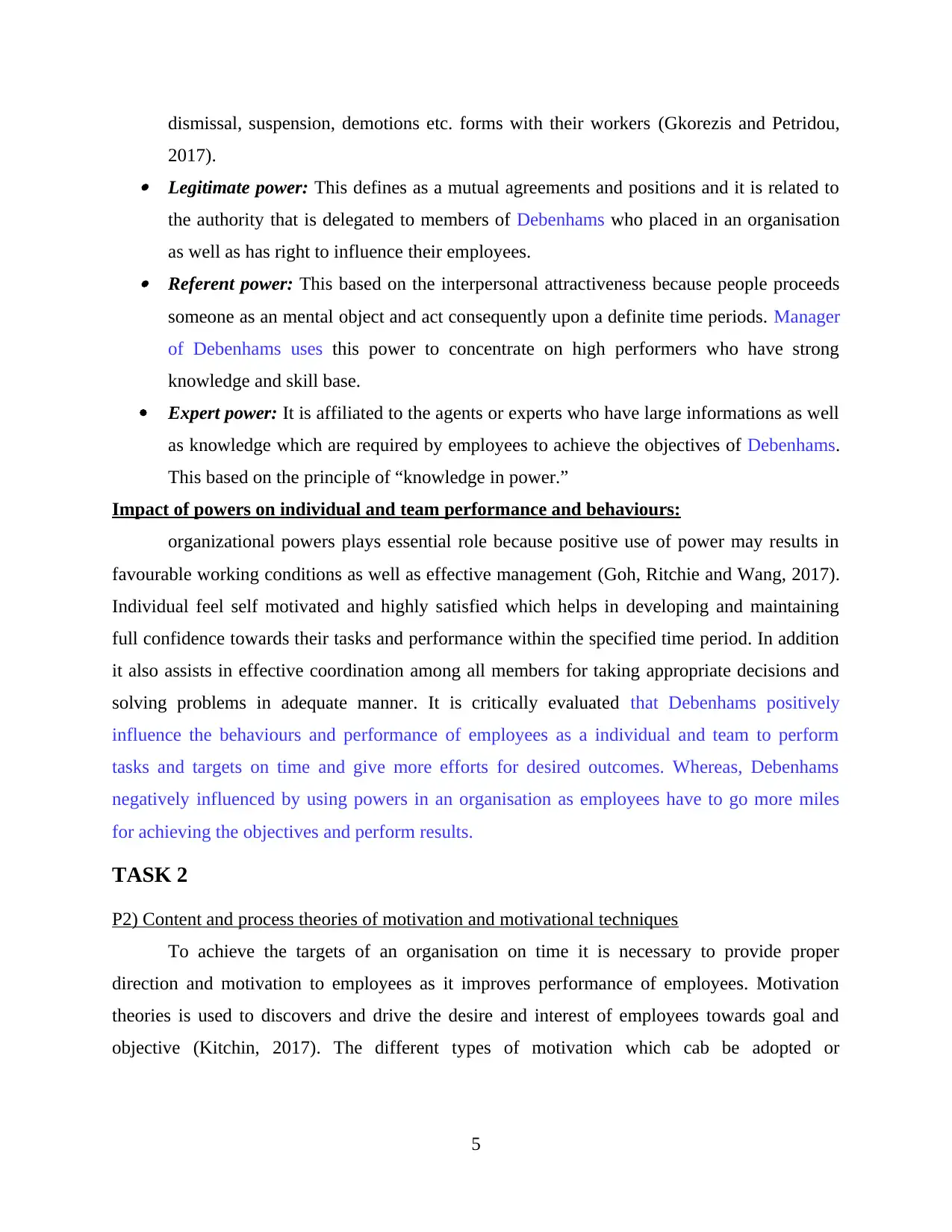
dismissal, suspension, demotions etc. forms with their workers (Gkorezis and Petridou,
2017). Legitimate power: This defines as a mutual agreements and positions and it is related to
the authority that is delegated to members of Debenhams who placed in an organisation
as well as has right to influence their employees. Referent power: This based on the interpersonal attractiveness because people proceeds
someone as an mental object and act consequently upon a definite time periods. Manager
of Debenhams uses this power to concentrate on high performers who have strong
knowledge and skill base.
Expert power: It is affiliated to the agents or experts who have large informations as well
as knowledge which are required by employees to achieve the objectives of Debenhams.
This based on the principle of “knowledge in power.”
Impact of powers on individual and team performance and behaviours:
organizational powers plays essential role because positive use of power may results in
favourable working conditions as well as effective management (Goh, Ritchie and Wang, 2017).
Individual feel self motivated and highly satisfied which helps in developing and maintaining
full confidence towards their tasks and performance within the specified time period. In addition
it also assists in effective coordination among all members for taking appropriate decisions and
solving problems in adequate manner. It is critically evaluated that Debenhams positively
influence the behaviours and performance of employees as a individual and team to perform
tasks and targets on time and give more efforts for desired outcomes. Whereas, Debenhams
negatively influenced by using powers in an organisation as employees have to go more miles
for achieving the objectives and perform results.
TASK 2
P2) Content and process theories of motivation and motivational techniques
To achieve the targets of an organisation on time it is necessary to provide proper
direction and motivation to employees as it improves performance of employees. Motivation
theories is used to discovers and drive the desire and interest of employees towards goal and
objective (Kitchin, 2017). The different types of motivation which cab be adopted or
5
2017). Legitimate power: This defines as a mutual agreements and positions and it is related to
the authority that is delegated to members of Debenhams who placed in an organisation
as well as has right to influence their employees. Referent power: This based on the interpersonal attractiveness because people proceeds
someone as an mental object and act consequently upon a definite time periods. Manager
of Debenhams uses this power to concentrate on high performers who have strong
knowledge and skill base.
Expert power: It is affiliated to the agents or experts who have large informations as well
as knowledge which are required by employees to achieve the objectives of Debenhams.
This based on the principle of “knowledge in power.”
Impact of powers on individual and team performance and behaviours:
organizational powers plays essential role because positive use of power may results in
favourable working conditions as well as effective management (Goh, Ritchie and Wang, 2017).
Individual feel self motivated and highly satisfied which helps in developing and maintaining
full confidence towards their tasks and performance within the specified time period. In addition
it also assists in effective coordination among all members for taking appropriate decisions and
solving problems in adequate manner. It is critically evaluated that Debenhams positively
influence the behaviours and performance of employees as a individual and team to perform
tasks and targets on time and give more efforts for desired outcomes. Whereas, Debenhams
negatively influenced by using powers in an organisation as employees have to go more miles
for achieving the objectives and perform results.
TASK 2
P2) Content and process theories of motivation and motivational techniques
To achieve the targets of an organisation on time it is necessary to provide proper
direction and motivation to employees as it improves performance of employees. Motivation
theories is used to discovers and drive the desire and interest of employees towards goal and
objective (Kitchin, 2017). The different types of motivation which cab be adopted or
5
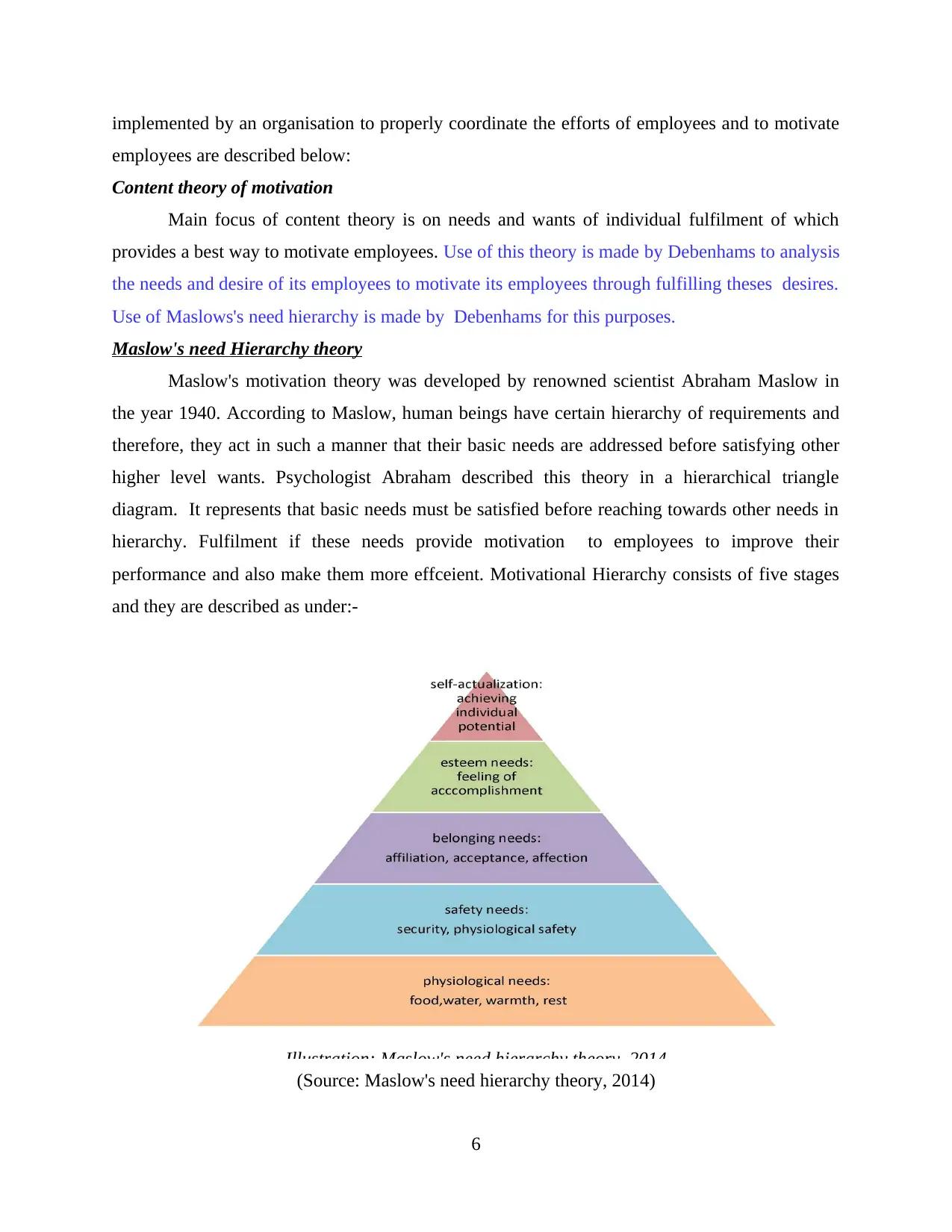
implemented by an organisation to properly coordinate the efforts of employees and to motivate
employees are described below:
Content theory of motivation
Main focus of content theory is on needs and wants of individual fulfilment of which
provides a best way to motivate employees. Use of this theory is made by Debenhams to analysis
the needs and desire of its employees to motivate its employees through fulfilling theses desires.
Use of Maslows's need hierarchy is made by Debenhams for this purposes.
Maslow's need Hierarchy theory
Maslow's motivation theory was developed by renowned scientist Abraham Maslow in
the year 1940. According to Maslow, human beings have certain hierarchy of requirements and
therefore, they act in such a manner that their basic needs are addressed before satisfying other
higher level wants. Psychologist Abraham described this theory in a hierarchical triangle
diagram. It represents that basic needs must be satisfied before reaching towards other needs in
hierarchy. Fulfilment if these needs provide motivation to employees to improve their
performance and also make them more effceient. Motivational Hierarchy consists of five stages
and they are described as under:-
(Source: Maslow's need hierarchy theory, 2014)
6
Illustration: Maslow's need hierarchy theory, 2014
employees are described below:
Content theory of motivation
Main focus of content theory is on needs and wants of individual fulfilment of which
provides a best way to motivate employees. Use of this theory is made by Debenhams to analysis
the needs and desire of its employees to motivate its employees through fulfilling theses desires.
Use of Maslows's need hierarchy is made by Debenhams for this purposes.
Maslow's need Hierarchy theory
Maslow's motivation theory was developed by renowned scientist Abraham Maslow in
the year 1940. According to Maslow, human beings have certain hierarchy of requirements and
therefore, they act in such a manner that their basic needs are addressed before satisfying other
higher level wants. Psychologist Abraham described this theory in a hierarchical triangle
diagram. It represents that basic needs must be satisfied before reaching towards other needs in
hierarchy. Fulfilment if these needs provide motivation to employees to improve their
performance and also make them more effceient. Motivational Hierarchy consists of five stages
and they are described as under:-
(Source: Maslow's need hierarchy theory, 2014)
6
Illustration: Maslow's need hierarchy theory, 2014
⊘ This is a preview!⊘
Do you want full access?
Subscribe today to unlock all pages.

Trusted by 1+ million students worldwide
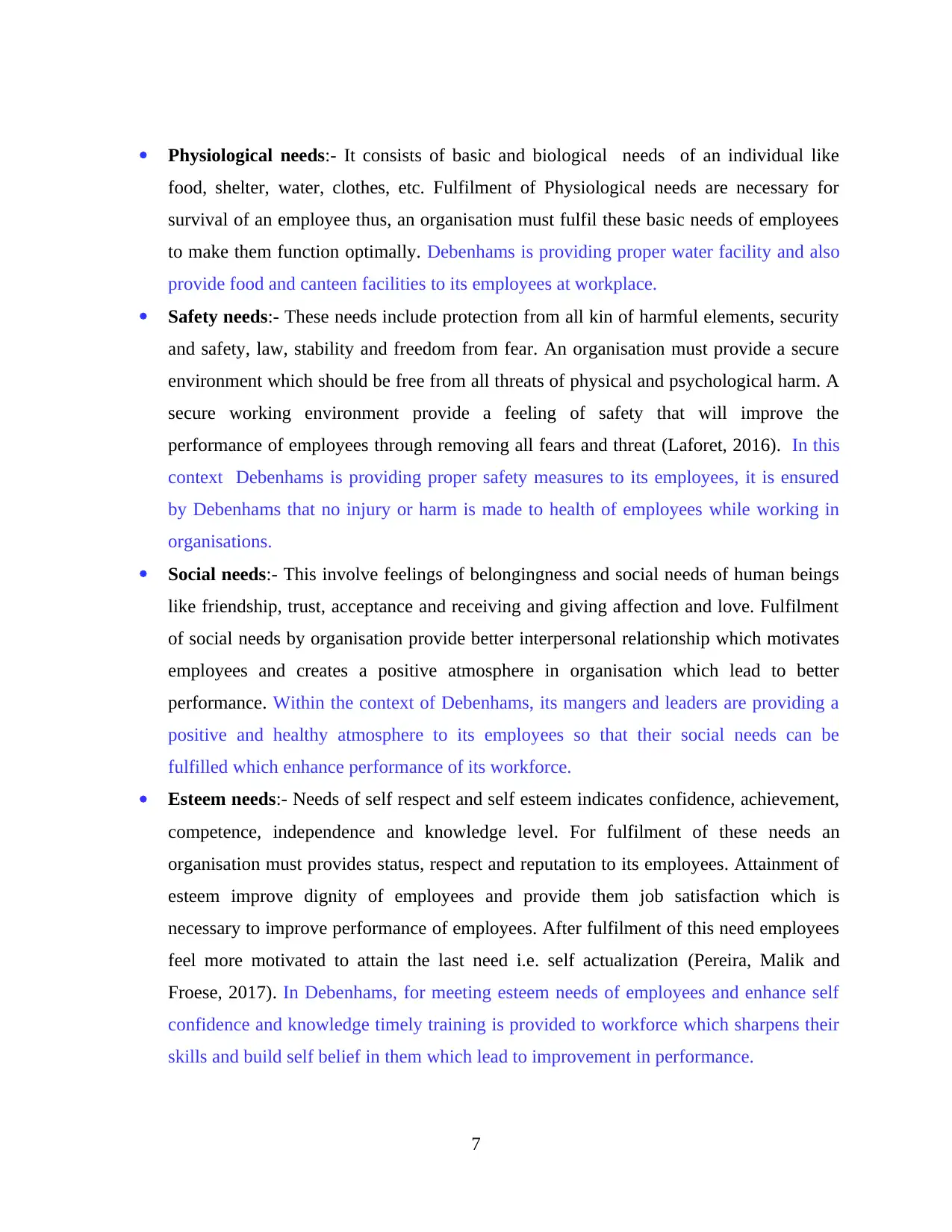
Physiological needs:- It consists of basic and biological needs of an individual like
food, shelter, water, clothes, etc. Fulfilment of Physiological needs are necessary for
survival of an employee thus, an organisation must fulfil these basic needs of employees
to make them function optimally. Debenhams is providing proper water facility and also
provide food and canteen facilities to its employees at workplace.
Safety needs:- These needs include protection from all kin of harmful elements, security
and safety, law, stability and freedom from fear. An organisation must provide a secure
environment which should be free from all threats of physical and psychological harm. A
secure working environment provide a feeling of safety that will improve the
performance of employees through removing all fears and threat (Laforet, 2016). In this
context Debenhams is providing proper safety measures to its employees, it is ensured
by Debenhams that no injury or harm is made to health of employees while working in
organisations.
Social needs:- This involve feelings of belongingness and social needs of human beings
like friendship, trust, acceptance and receiving and giving affection and love. Fulfilment
of social needs by organisation provide better interpersonal relationship which motivates
employees and creates a positive atmosphere in organisation which lead to better
performance. Within the context of Debenhams, its mangers and leaders are providing a
positive and healthy atmosphere to its employees so that their social needs can be
fulfilled which enhance performance of its workforce.
Esteem needs:- Needs of self respect and self esteem indicates confidence, achievement,
competence, independence and knowledge level. For fulfilment of these needs an
organisation must provides status, respect and reputation to its employees. Attainment of
esteem improve dignity of employees and provide them job satisfaction which is
necessary to improve performance of employees. After fulfilment of this need employees
feel more motivated to attain the last need i.e. self actualization (Pereira, Malik and
Froese, 2017). In Debenhams, for meeting esteem needs of employees and enhance self
confidence and knowledge timely training is provided to workforce which sharpens their
skills and build self belief in them which lead to improvement in performance.
7
food, shelter, water, clothes, etc. Fulfilment of Physiological needs are necessary for
survival of an employee thus, an organisation must fulfil these basic needs of employees
to make them function optimally. Debenhams is providing proper water facility and also
provide food and canteen facilities to its employees at workplace.
Safety needs:- These needs include protection from all kin of harmful elements, security
and safety, law, stability and freedom from fear. An organisation must provide a secure
environment which should be free from all threats of physical and psychological harm. A
secure working environment provide a feeling of safety that will improve the
performance of employees through removing all fears and threat (Laforet, 2016). In this
context Debenhams is providing proper safety measures to its employees, it is ensured
by Debenhams that no injury or harm is made to health of employees while working in
organisations.
Social needs:- This involve feelings of belongingness and social needs of human beings
like friendship, trust, acceptance and receiving and giving affection and love. Fulfilment
of social needs by organisation provide better interpersonal relationship which motivates
employees and creates a positive atmosphere in organisation which lead to better
performance. Within the context of Debenhams, its mangers and leaders are providing a
positive and healthy atmosphere to its employees so that their social needs can be
fulfilled which enhance performance of its workforce.
Esteem needs:- Needs of self respect and self esteem indicates confidence, achievement,
competence, independence and knowledge level. For fulfilment of these needs an
organisation must provides status, respect and reputation to its employees. Attainment of
esteem improve dignity of employees and provide them job satisfaction which is
necessary to improve performance of employees. After fulfilment of this need employees
feel more motivated to attain the last need i.e. self actualization (Pereira, Malik and
Froese, 2017). In Debenhams, for meeting esteem needs of employees and enhance self
confidence and knowledge timely training is provided to workforce which sharpens their
skills and build self belief in them which lead to improvement in performance.
7
Paraphrase This Document
Need a fresh take? Get an instant paraphrase of this document with our AI Paraphraser
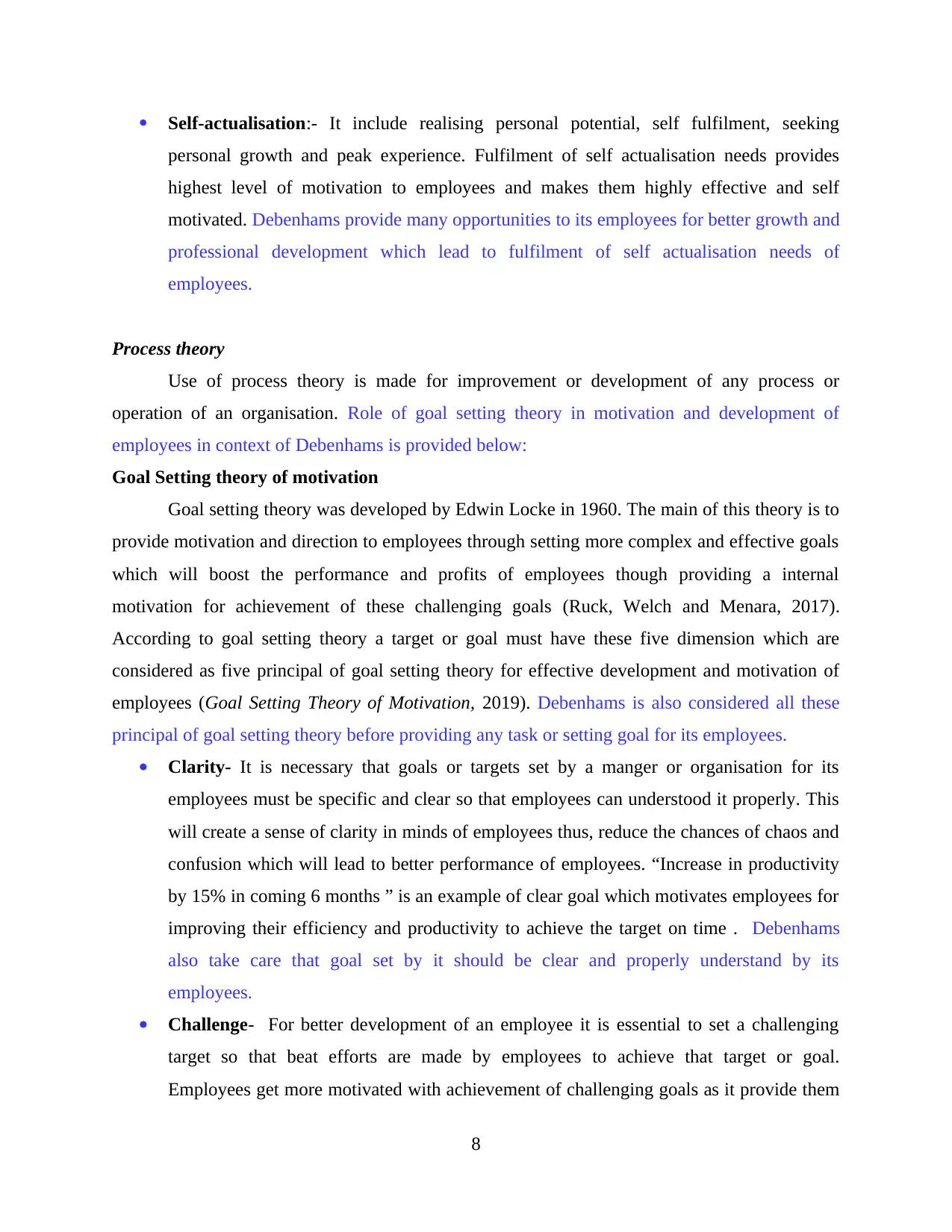
Self-actualisation:- It include realising personal potential, self fulfilment, seeking
personal growth and peak experience. Fulfilment of self actualisation needs provides
highest level of motivation to employees and makes them highly effective and self
motivated. Debenhams provide many opportunities to its employees for better growth and
professional development which lead to fulfilment of self actualisation needs of
employees.
Process theory
Use of process theory is made for improvement or development of any process or
operation of an organisation. Role of goal setting theory in motivation and development of
employees in context of Debenhams is provided below:
Goal Setting theory of motivation
Goal setting theory was developed by Edwin Locke in 1960. The main of this theory is to
provide motivation and direction to employees through setting more complex and effective goals
which will boost the performance and profits of employees though providing a internal
motivation for achievement of these challenging goals (Ruck, Welch and Menara, 2017).
According to goal setting theory a target or goal must have these five dimension which are
considered as five principal of goal setting theory for effective development and motivation of
employees (Goal Setting Theory of Motivation, 2019). Debenhams is also considered all these
principal of goal setting theory before providing any task or setting goal for its employees.
Clarity- It is necessary that goals or targets set by a manger or organisation for its
employees must be specific and clear so that employees can understood it properly. This
will create a sense of clarity in minds of employees thus, reduce the chances of chaos and
confusion which will lead to better performance of employees. “Increase in productivity
by 15% in coming 6 months ” is an example of clear goal which motivates employees for
improving their efficiency and productivity to achieve the target on time . Debenhams
also take care that goal set by it should be clear and properly understand by its
employees.
Challenge- For better development of an employee it is essential to set a challenging
target so that beat efforts are made by employees to achieve that target or goal.
Employees get more motivated with achievement of challenging goals as it provide them
8
personal growth and peak experience. Fulfilment of self actualisation needs provides
highest level of motivation to employees and makes them highly effective and self
motivated. Debenhams provide many opportunities to its employees for better growth and
professional development which lead to fulfilment of self actualisation needs of
employees.
Process theory
Use of process theory is made for improvement or development of any process or
operation of an organisation. Role of goal setting theory in motivation and development of
employees in context of Debenhams is provided below:
Goal Setting theory of motivation
Goal setting theory was developed by Edwin Locke in 1960. The main of this theory is to
provide motivation and direction to employees through setting more complex and effective goals
which will boost the performance and profits of employees though providing a internal
motivation for achievement of these challenging goals (Ruck, Welch and Menara, 2017).
According to goal setting theory a target or goal must have these five dimension which are
considered as five principal of goal setting theory for effective development and motivation of
employees (Goal Setting Theory of Motivation, 2019). Debenhams is also considered all these
principal of goal setting theory before providing any task or setting goal for its employees.
Clarity- It is necessary that goals or targets set by a manger or organisation for its
employees must be specific and clear so that employees can understood it properly. This
will create a sense of clarity in minds of employees thus, reduce the chances of chaos and
confusion which will lead to better performance of employees. “Increase in productivity
by 15% in coming 6 months ” is an example of clear goal which motivates employees for
improving their efficiency and productivity to achieve the target on time . Debenhams
also take care that goal set by it should be clear and properly understand by its
employees.
Challenge- For better development of an employee it is essential to set a challenging
target so that beat efforts are made by employees to achieve that target or goal.
Employees get more motivated with achievement of challenging goals as it provide them
8
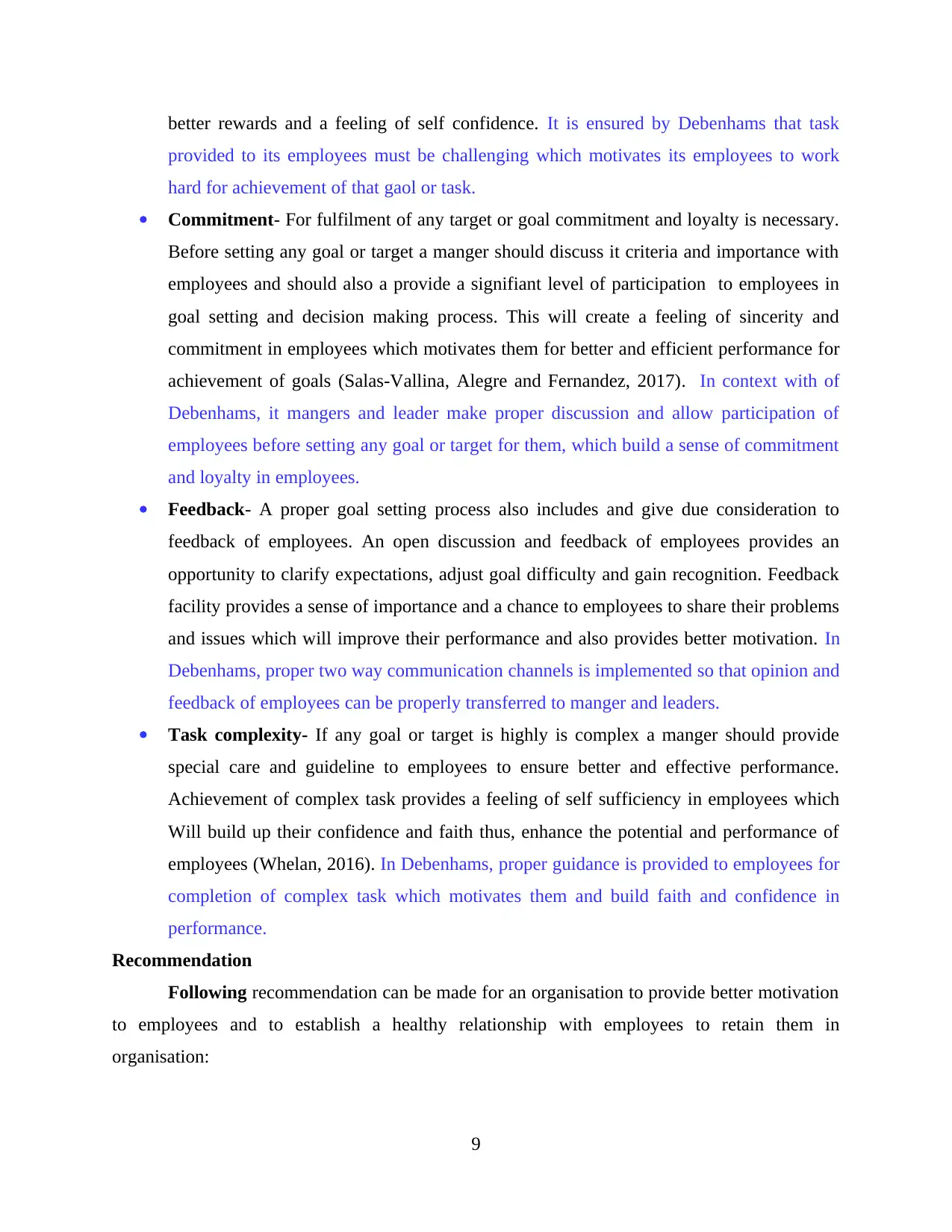
better rewards and a feeling of self confidence. It is ensured by Debenhams that task
provided to its employees must be challenging which motivates its employees to work
hard for achievement of that gaol or task.
Commitment- For fulfilment of any target or goal commitment and loyalty is necessary.
Before setting any goal or target a manger should discuss it criteria and importance with
employees and should also a provide a signifiant level of participation to employees in
goal setting and decision making process. This will create a feeling of sincerity and
commitment in employees which motivates them for better and efficient performance for
achievement of goals (Salas-Vallina, Alegre and Fernandez, 2017). In context with of
Debenhams, it mangers and leader make proper discussion and allow participation of
employees before setting any goal or target for them, which build a sense of commitment
and loyalty in employees.
Feedback- A proper goal setting process also includes and give due consideration to
feedback of employees. An open discussion and feedback of employees provides an
opportunity to clarify expectations, adjust goal difficulty and gain recognition. Feedback
facility provides a sense of importance and a chance to employees to share their problems
and issues which will improve their performance and also provides better motivation. In
Debenhams, proper two way communication channels is implemented so that opinion and
feedback of employees can be properly transferred to manger and leaders.
Task complexity- If any goal or target is highly is complex a manger should provide
special care and guideline to employees to ensure better and effective performance.
Achievement of complex task provides a feeling of self sufficiency in employees which
Will build up their confidence and faith thus, enhance the potential and performance of
employees (Whelan, 2016). In Debenhams, proper guidance is provided to employees for
completion of complex task which motivates them and build faith and confidence in
performance.
Recommendation
Following recommendation can be made for an organisation to provide better motivation
to employees and to establish a healthy relationship with employees to retain them in
organisation:
9
provided to its employees must be challenging which motivates its employees to work
hard for achievement of that gaol or task.
Commitment- For fulfilment of any target or goal commitment and loyalty is necessary.
Before setting any goal or target a manger should discuss it criteria and importance with
employees and should also a provide a signifiant level of participation to employees in
goal setting and decision making process. This will create a feeling of sincerity and
commitment in employees which motivates them for better and efficient performance for
achievement of goals (Salas-Vallina, Alegre and Fernandez, 2017). In context with of
Debenhams, it mangers and leader make proper discussion and allow participation of
employees before setting any goal or target for them, which build a sense of commitment
and loyalty in employees.
Feedback- A proper goal setting process also includes and give due consideration to
feedback of employees. An open discussion and feedback of employees provides an
opportunity to clarify expectations, adjust goal difficulty and gain recognition. Feedback
facility provides a sense of importance and a chance to employees to share their problems
and issues which will improve their performance and also provides better motivation. In
Debenhams, proper two way communication channels is implemented so that opinion and
feedback of employees can be properly transferred to manger and leaders.
Task complexity- If any goal or target is highly is complex a manger should provide
special care and guideline to employees to ensure better and effective performance.
Achievement of complex task provides a feeling of self sufficiency in employees which
Will build up their confidence and faith thus, enhance the potential and performance of
employees (Whelan, 2016). In Debenhams, proper guidance is provided to employees for
completion of complex task which motivates them and build faith and confidence in
performance.
Recommendation
Following recommendation can be made for an organisation to provide better motivation
to employees and to establish a healthy relationship with employees to retain them in
organisation:
9
⊘ This is a preview!⊘
Do you want full access?
Subscribe today to unlock all pages.

Trusted by 1+ million students worldwide
1 out of 20
Related Documents
Your All-in-One AI-Powered Toolkit for Academic Success.
+13062052269
info@desklib.com
Available 24*7 on WhatsApp / Email
![[object Object]](/_next/static/media/star-bottom.7253800d.svg)
Unlock your academic potential
Copyright © 2020–2025 A2Z Services. All Rights Reserved. Developed and managed by ZUCOL.





